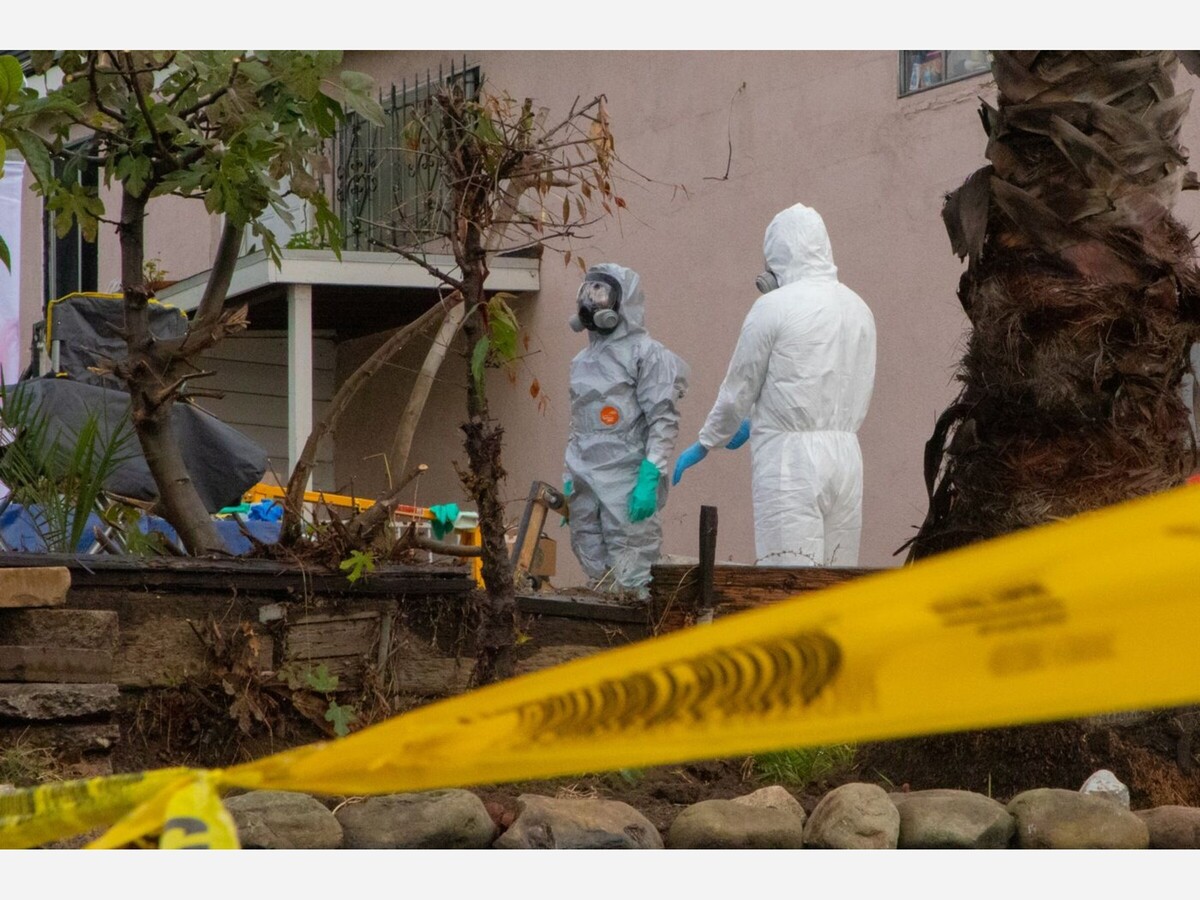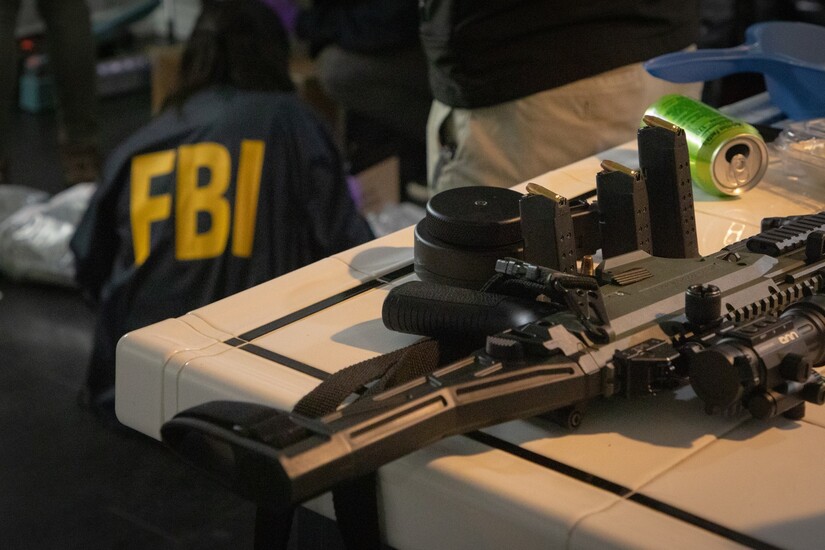Image


LOS ANGELES – A news conference was held today by Federal officials in Santa Ana, to inform the public of law enforcement's ongoing efforts to stem the widespread damage caused by fentanyl, an extremely dangerous synthetic opioid that has tainted almost every corner of the illicit drug market and is killing Americans at an exceptional level.
*Federal officials are geared towards eliminating drug organizations that are mass-producing fake pills containing fentanyl that are marketed on the darknet and through dealers openly operating on social media sites as well as other active programs in the Southern California area that target and identify street-level dealers who sell products that lead to fatal fentanyl poisonings, as well as those trafficking wholesale quantities of bulk fentanyl, and counterfeit pharmaceutical pills produced by drug cartels.
*United States Attorney Martin Estrada, DEA Special Agent in Charge Bill Bodner, FBI Special Agent in Charge Brian Gilhooly, Homeland Security Investigations (HSI) Acting Special Agent in Charge Eddy Wang, and United States Postal Inspection Service Assistant Inspector in Charge Larry Hirose today outlined these enforcement initiatives and highlighted specific cases that demonstrate the severe danger fentanyl poses to public health, as well as the consequences criminals face by putting their customers’ lives at risk. These officials also outlined significant public outreach and education efforts, such as the “One Pill Can Kill” campaign.
“The fentanyl epidemic is a crisis that demands our full attention,” U.S. Attorney Estrada said. “This poison is targeting our young people, causing untold damage to families, neighborhoods, and our entire nation. We are fighting back. We have dramatically ramped up our efforts to stem the flow of narcotics, to vigorously prosecute those directly responsible for peddling this poison, and to respond in innovative ways to improve public safety and educate the public.”
“Violent drug cartels, specifically the Sinaloa Cartel and Jalisco New Generation Cartel, are deliberately pushing deadly fentanyl into our communities with complete disregard for human lives in an effort to maximize their profits,” said DEA Los Angeles Special Agent in Charge Bill Bodner. “Drug poisonings and drug-caused deaths are affecting families across the nation and killing Americans, teens and adults, at historic rates. We are targeting any individual responsible in the drug supply chain – from high-level drug traffickers to street level dealers – who deceptively sell this poison and create further addiction.”
Officials today announced that on Friday, November 18, a federal grand jury returned an indictment charging a Cerritos man with heading an organization that obtained bulk fentanyl, operated labs in Inglewood and Compton that used high-speed pill presses to create fake pills containing fentanyl and methamphetamine, and sold millions of pills to thousands of customers on the darknet. Christopher Hampton, 36, was named in an 11-count indictment that charges him with various narcotics and weapons offenses that could result in a sentence of life in federal prison.
Hampton – who was active on at least nine darknet marketplaces, where he typically used the moniker “Narco710” – was arrested on November 2, at which time agents with the FBI, DEA, HSI, and the Bureau of Alcohol, Tobacco, Firearms, and Explosives, along with U.S. Postal Inspectors, executed search warrants. Those searches led to the discovery and seizure of 450 pounds of suspected narcotics; six pill press machines, some of which were capable of producing thousands of pills per hour; and illegal firearms that included assault rifles and a suspected machine gun. Agents also recovered from Hampton’s residence more than 20,000 multi-colored pills containing fentanyl – so-called “skittles” manufactured to resemble oxycodone pills.
The indictment alleges that Hampton sold nearly $2 million worth of narcotics on just two darknet marketplaces that he and his co-conspirators controlled.
The investigation into Hampton was conducted by the FBI-led Joint Criminal Opioid Darknet Enforcement Team (J-CODE) and the DEA HIDTA Tactical Diversion Squad. J-CODE targets darknet vendors by using sophisticated, high-tech techniques to identify drug traffickers who wrongly believe the dark web allows them to engage in criminal conduct with anonymity.
Assistant United States Attorneys Ian Yanniello of the General Crimes Section and James A. Santiago of the International Narcotics, Money Laundering, and Racketeering Section are prosecuting this case.
Hampton, who is being held without bond, is scheduled to be arraigned on the indictment Wednesday in the United States District Court.
“Every parent and guardian must educate themselves and their children of all ages about poisonous fentanyl-laced drugs being sold on social media applications and via the darknet,” said Don Alway, the Assistant Director in Charge of the FBI’s Los Angeles Field Office. “The FBI and our partners operate the Joint Criminal Opioid and Darknet Enforcement Team (J-CODE) to disrupt and dismantle illicit marketplaces facilitating the distribution of fentanyl and other opioids on the Darknet. Since its inception, J-CODE efforts have led to the arrests of over 300 darknet drug traffickers and the seizure of $42 million and 800 kilograms of narcotics, as well as 145 firearms. These enforcement efforts, as well as educating buyers, will have an impact on this scourge to society which is taking lives *in unprecedented numbers.”
An additional important factor of the response to the fentanyl epidemic is the continued efforts of the Overdose Justice Task Force, a DEA-led project developed to investigate fatal fentanyl poisonings and identify the drug dealer who sold the narcotics that caused the death.
Under the Overdose Justice program for the DEA’s Los Angeles Field Division, DEA agents work with local law enforcement to analyze evidence to determine if there are circumstances that may lead to federal illegal prosecution, and, if so, target the drug trafficker.
The project was launched approximately four years ago. The U.S. Attorney’s Office has filed charges against 51 defendants who allegedly marketed drugs that resulted in fatal poisoning. Almost all of these cases involve fentanyl, and some of the cases involve numerous deaths, including two pending cases filed in Santa Ana in April 2022.
Court documents filed earlier in November stated that 27-year-old Jason Amin Soheili, of Laguna Hills, agreed to plead guilty to two counts of distribution of fentanyl resulting in death. Soheili is anticipated to formally enter his guilty pleas in December 2022, agreeing to serve a federal prison sentence of at least 20 years.
Soheili was arrested in May 2021 and remains in custody on charges alleging he mailed at least two fake oxycodone pills containing fentanyl to a male victim in Fillmore, Utah. The man died on February 21, 2021. Five weeks later, Soheili provided cocaine laced with fentanyl to another person who passed off fentanyl poisoning at his parents’ home in Aliso Viejo.
Assistant United States Attorney Kristin N. Spencer of the Santa Ana Branch Office is prosecuting this case, which was investigated by the United States Postal Inspection Service and the Orange County Sheriff’s Department.
“It is our duty as postal inspectors to go after those individuals who attempt to ship through the U.S. mail illicit drugs like fentanyl or the components used to manufacture them,” said Assistant Inspector in Charge Hirose. “We remain steadfast in our resolve to seek justice to the end and to keep communities safe. This goal is achieved through collaborative investigative efforts with other law enforcement agencies.”
Additional cases are pending obtained as a result of the Overdose Justice project and include one against Jonathan Limas-Reyes, 26, a resident of Downe, whom DEA agents apprehended in August on a charge of selling fake pills containing fentanyl to a high school student age 17, who died. The Downey Police Department provided significant help in this matter. The trial, in this case, is being prosecuted by Assistant United States Attorney David W. Williams of the General Crimes Section and is scheduled for court on June 6, 2023.
Federal officials continue to use traditional law enforcement techniques to prohibit dangerous narcotics from being transported and delivered in wholesale quantities.
There are multiple continuous investigations targeting large-scale operations trafficking fentanyl, many of which are made by Mexico-based narcotic cartels that are selling fentanyl in ever-increasing amounts.
“With Los Angeles’ close proximity to the U.S.-Mexico border, it has become one of the largest fentanyl distribution hubs,” said HSI Los Angeles Acting Special Agent in Charge Eddy Wang. “As such, HSI Los Angeles has prioritized the targeting of fentanyl traffickers and will work tirelessly with our federal, state, local, and international partners to remove this deadly poison from our streets.”
Officials seized enormous shipments of bulk fentanyl and fentanyl-laced fake pills in 2022. In the operation conducted in Inglewood in July, officers seized a shipment of nearly 1 million fake pills containing fentanyl. This matter is an issue of continuous investigation.
In the latter part of October, after months of talking about a potential transaction involving 2 million fentanyl-laced pills, DEA agents working with investigators from the Hawthorne Police Department led an operation and seized over 800,000 fake pills, containing fentanyl. The individual who delivered that shipment, George Ramirez, 34, a resident of San Diego was arrested on October 28. Ramirez is now being held without bail on charges of possession with intent to distribute controlled substances.
The Fullerton Police Department and the Hawthorne Police Department provided substantial assistance during the investigation into Ramirez.
The case against Ramirez is being prosecuted by Assistant United States Attorneys Afia Bondero and Alix McKenna of the General Crimes Section.
With all of the pending cases noted above, indictments and criminal complaints contain allegations that a defendant has committed a crime. Every defendant is presumed innocent until and unless proven guilty beyond a reasonable doubt.

This report originated from the Depart of Justice and was updated by Anita Johnson-Brown, Editor.
Video and photos courtesy of the DEA